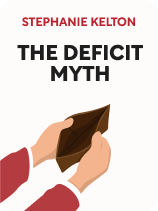

This article is an excerpt from the Shortform book guide to "The Deficit Myth" by Stephanie Kelton. Shortform has the world's best summaries and analyses of books you should be reading.
Like this article? Sign up for a free trial here .
Do you think having a job is a fundamental right for all people? What would the pros and cons of a federal job guarantee be? Has congress ever looked into making a program like this?
Stephanie Kelton, economist and the author of The Deficit Myth, says that a federal job guarantee is crucial for establishing economic order. However, critics say that a program like this would cost too much and could lead to corruption.
Continue reading to learn more about what a federal job guarantee could mean for the United States.
Jobs As a Right
To use the federal government’s extraordinary fiscal power to create a society that is more equitable, sustainable, and prosperous, Kelton proposes a federal job guarantee.
She positions this as a crucial remaking of the economic order—having the federal government serve as an employer of last resort, guaranteeing the fundamental right to a job for anyone who wants one. As we’ve explored, the federal government can always create the dollars needed to finance the program. She writes that a federal job guarantee would reap important benefits for the economy and society as a whole.
During regular slumps in the business cycle, people who would normally be laid off and remain without jobs for months or even years would instead have the option to be immediately rehired by the federal government. Participation in the program would be counter-cyclical—rising during recessions, shrinking during booms.
It would also help to shore up state and local tax revenues during recessions because participants would now be earning paychecks and paying these taxes. This helps the economy avoid the typical cascading job losses that occur during a recession, when state and local governments are forced to lay off civil servants, firefighters, teachers, police officers, and other workers when tax revenues plummet.
The federal jobs guarantee would benefit everyone, even those who don’t directly participate—because more jobs means more income and more consumers for businesses, which means more jobs and investment throughout the economy. The federal job guarantee would break the cycle of mass unemployment that spreads and causes business failures throughout the economy.
A federal job guarantee would also improve the bargaining power of labor (because it would be easier for people in the private sector to leave bad or exploitative jobs), while setting a minimum federal standard for wages and benefits, as private-sector firms would have to compete for talent with the federal program.
Perhaps best of all, the work done by participants in the program would help to address society’s most pressing needs. The federal job guarantee program could help redirect much-needed talent toward addressing shortages in nursing and eldercare; moving our energy grid toward a zero-emissions future; and repairing and modernizing the nation’s outdated infrastructure.
History and Criticism
With the rising specter of mass unemployment due to automation and concerns about the future of work, lawmakers in Washington, D.C. have reignited the debate around a federal job guarantee. However, the fight over such a program actually dates back to the 1970s, when Congress passed the Humphrey-Hawkins Full Employment and Balanced Growth Act of 1978.
The original version of this bill would have set explicit national employment goals—and, if they weren’t met, had the federal government make up the difference by directly supplying jobs to meet the target. In fact, unemployed workers would have had the right to sue the federal government if they didn’t receive a job. However, the bill was significantly watered down before it was signed into law by President Jimmy Carter. Although the nominal employment targets remained in the legislation, there would be no legal obligation for the federal government to take action to meet them, nor would there be any codified right to a job.
Today’s proponents argue that a federal job guarantee is a better alternative to other proposed solutions to automation, such as universal basic income, because creating useful private- and public-sector jobs would enable Americans to reap the dignity of doing real and meaningful work—while avoiding the social stigma of welfare or direct cash transfers.
On the other hand, critics of the federal job guarantee cite not only the program’s extraordinary cost, but also what they see as opportunities for corruption. They argue that the program would have the potential to become rapidly politicized, as politicians would scheme to have jobs projects of dubious economic value located in their home states or districts to enhance their election prospects. Moreover, critics worry that the fact that it’s a guarantee (by definition, someone can’t be fired from the program) would have the effect of degrading labor standards in the workforce.

———End of Preview———
Like what you just read? Read the rest of the world's best book summary and analysis of Stephanie Kelton's "The Deficit Myth" at Shortform .
Here's what you'll find in our full The Deficit Myth summary :
- A look at national debt through the lens of Modern Monetary Theory
- How public discourse about national debts and deficits gets the facts wrong
- Why MMT says the U.S. government could finance any program it wishes to create






